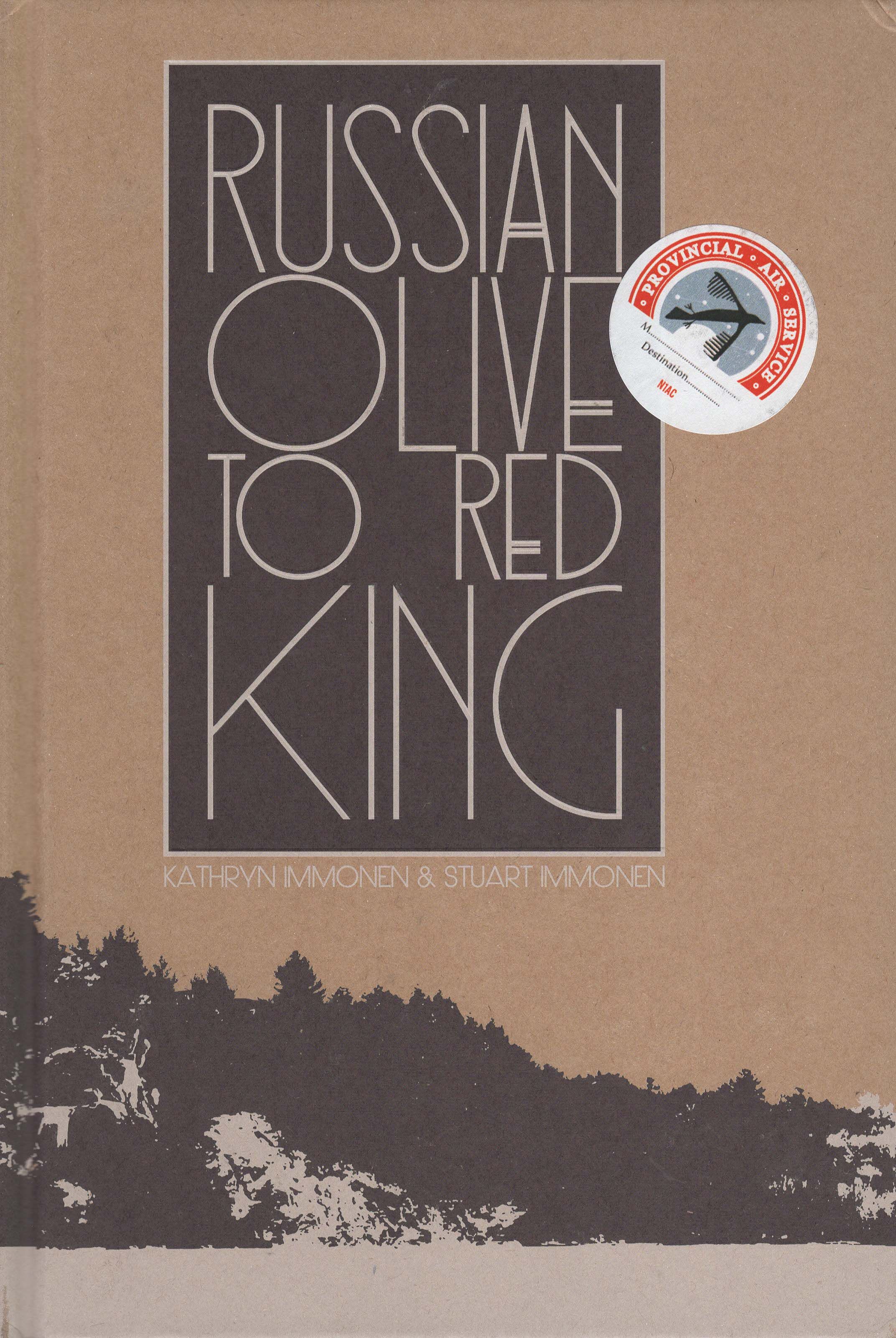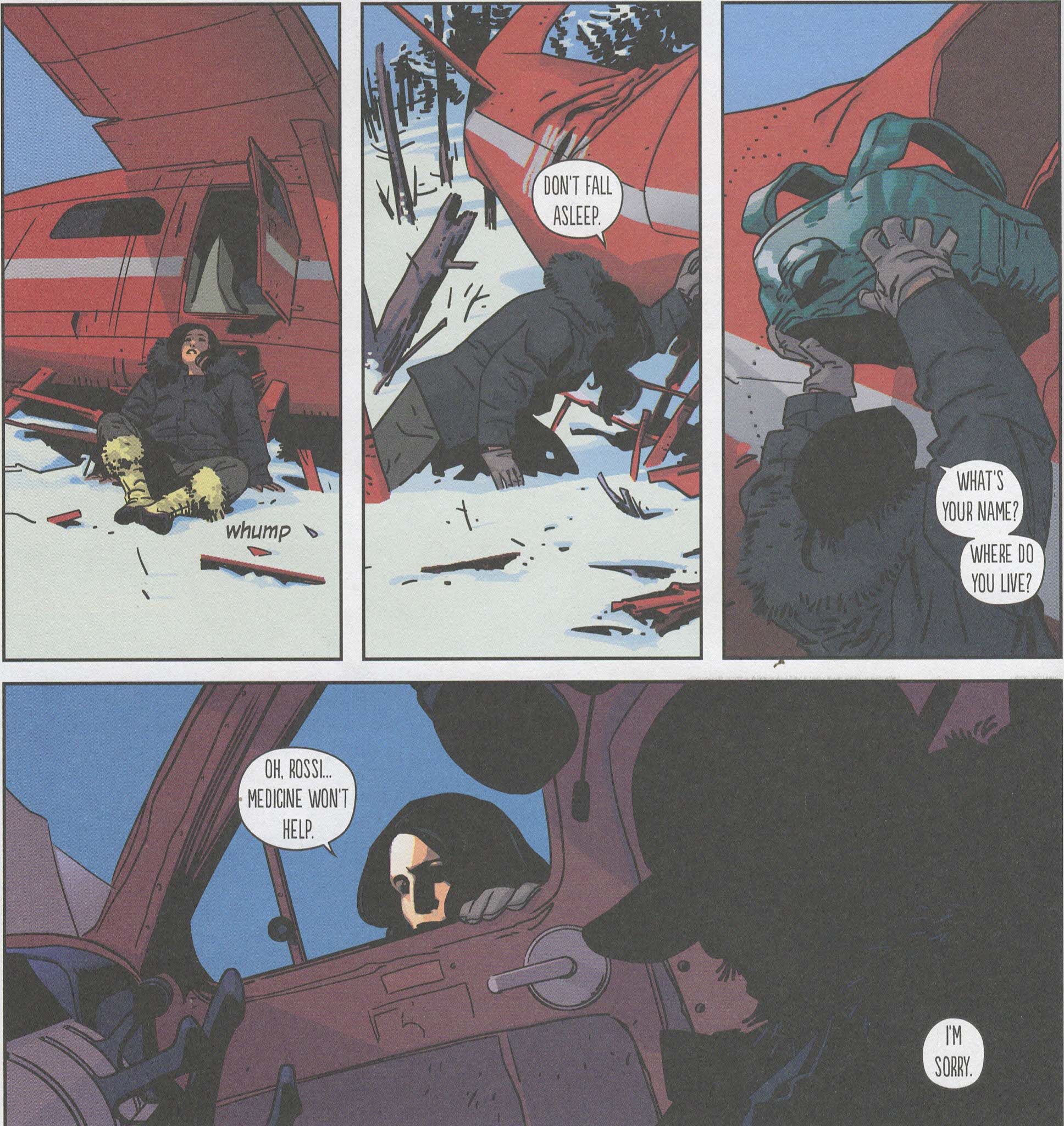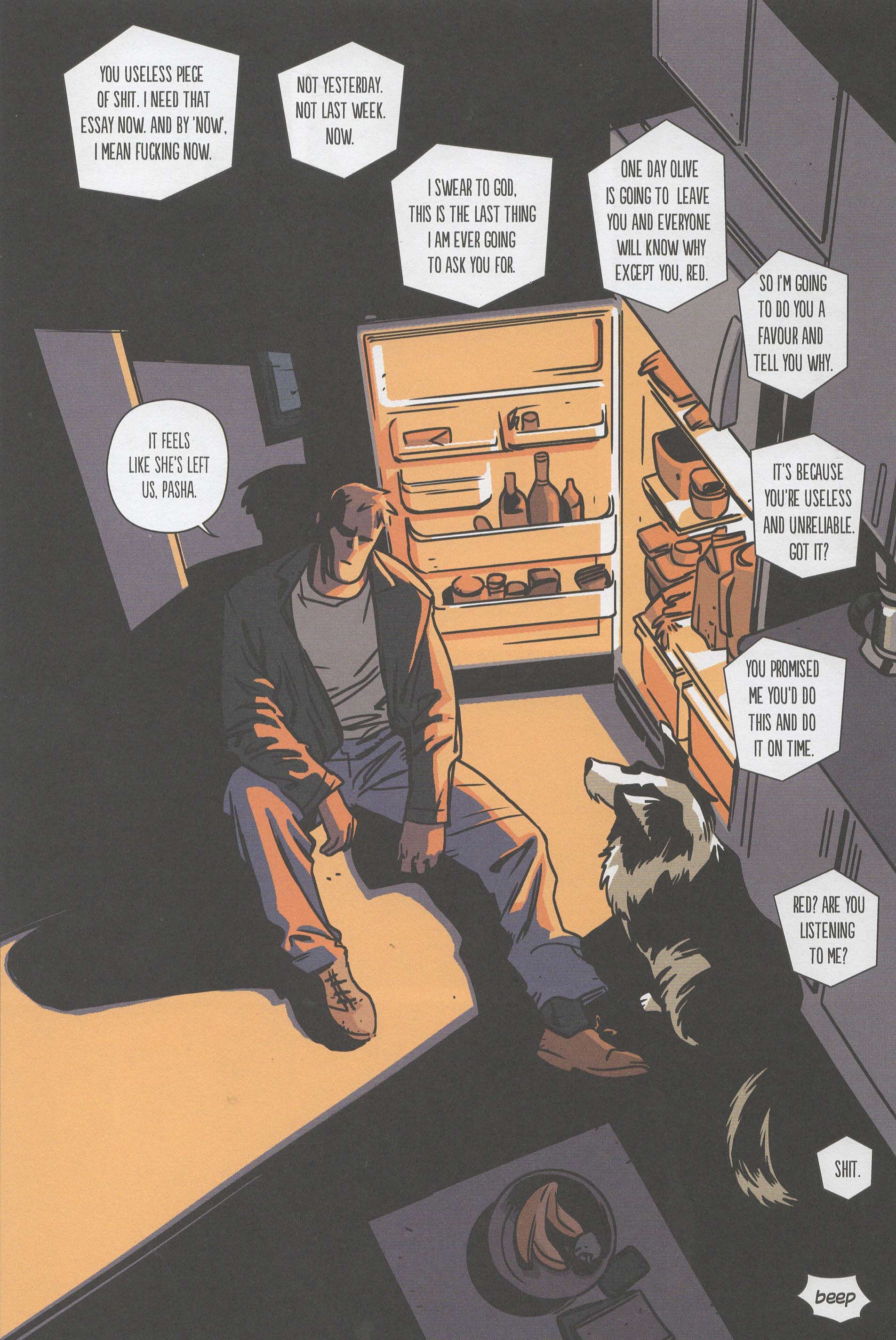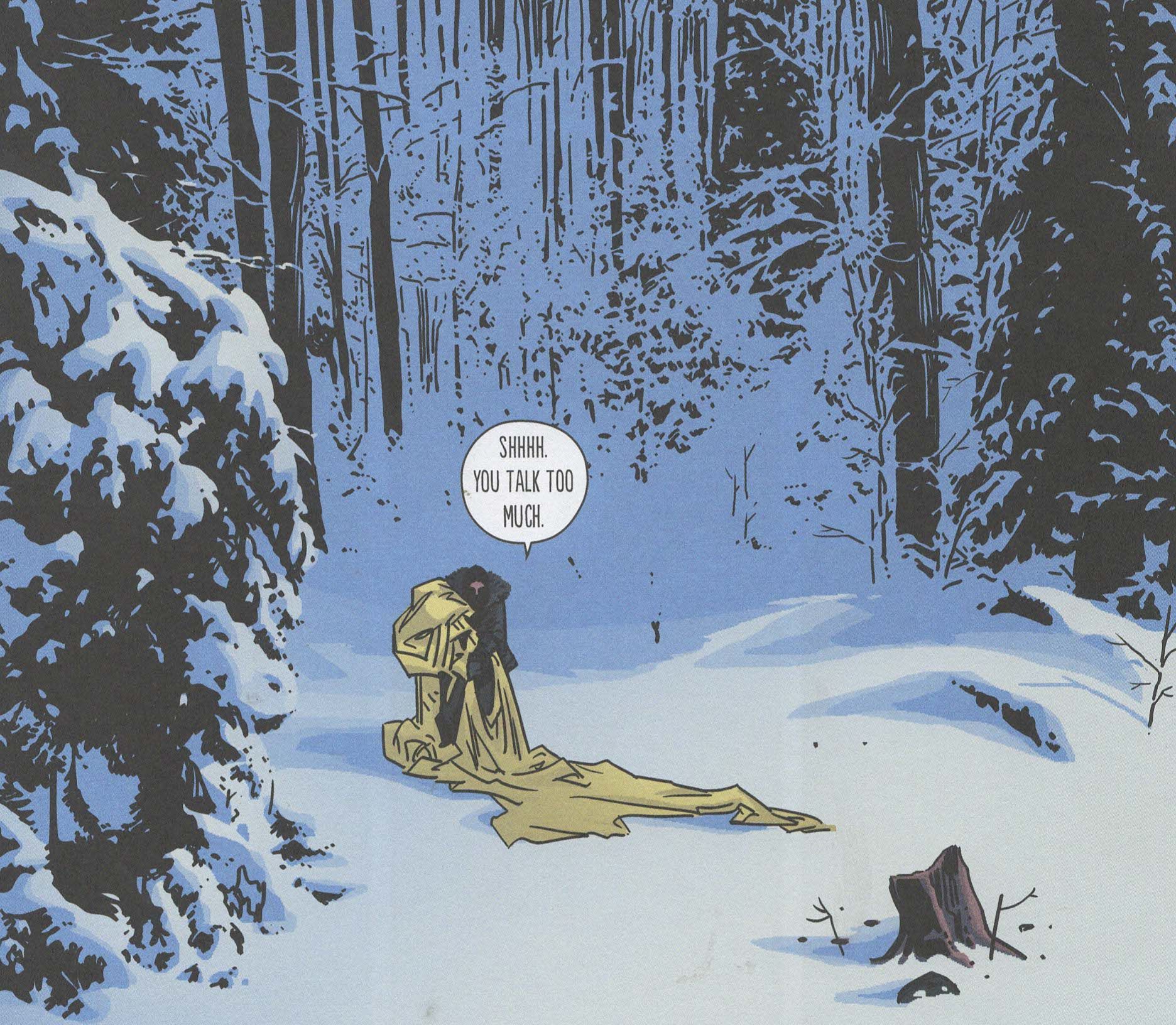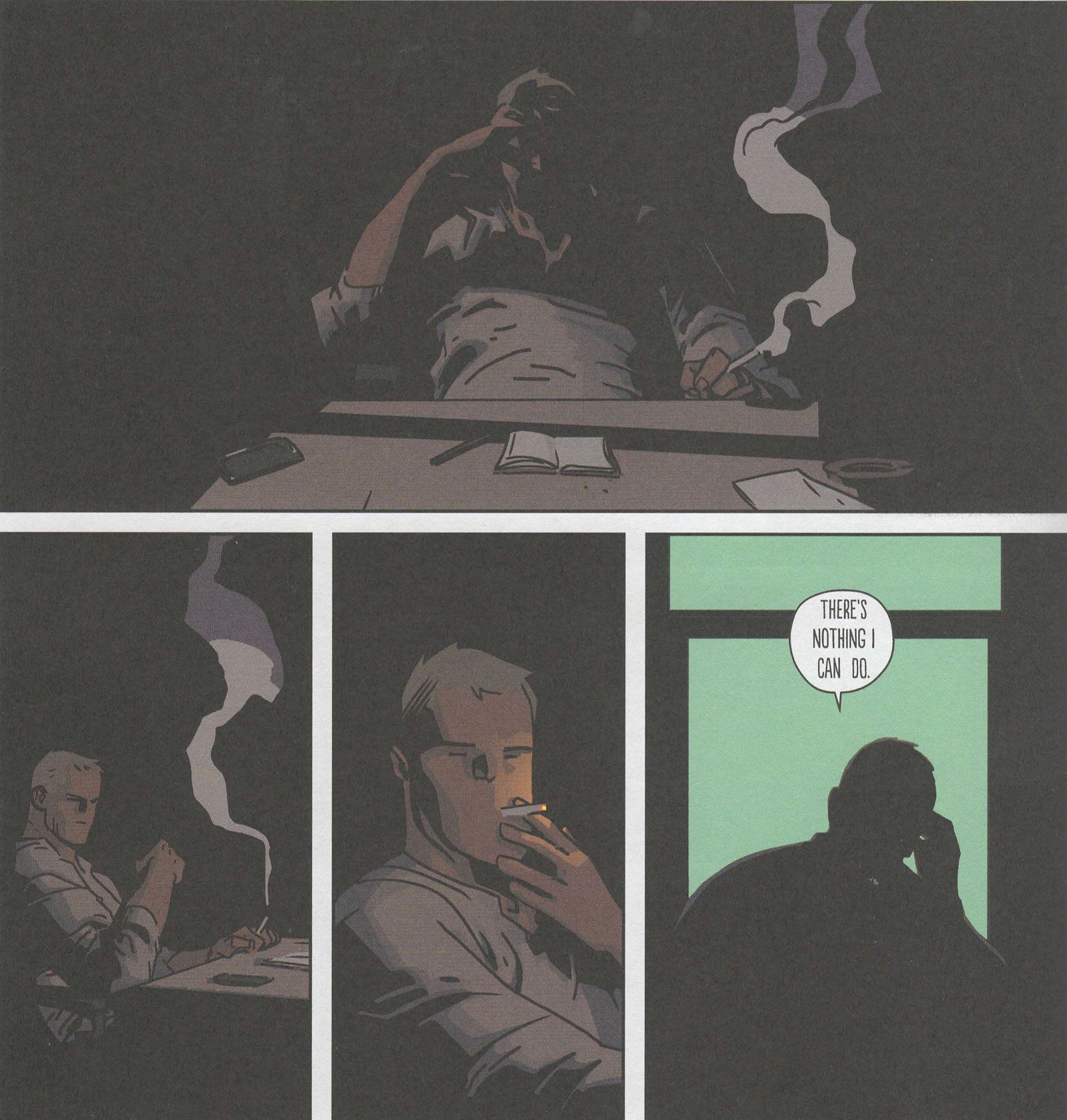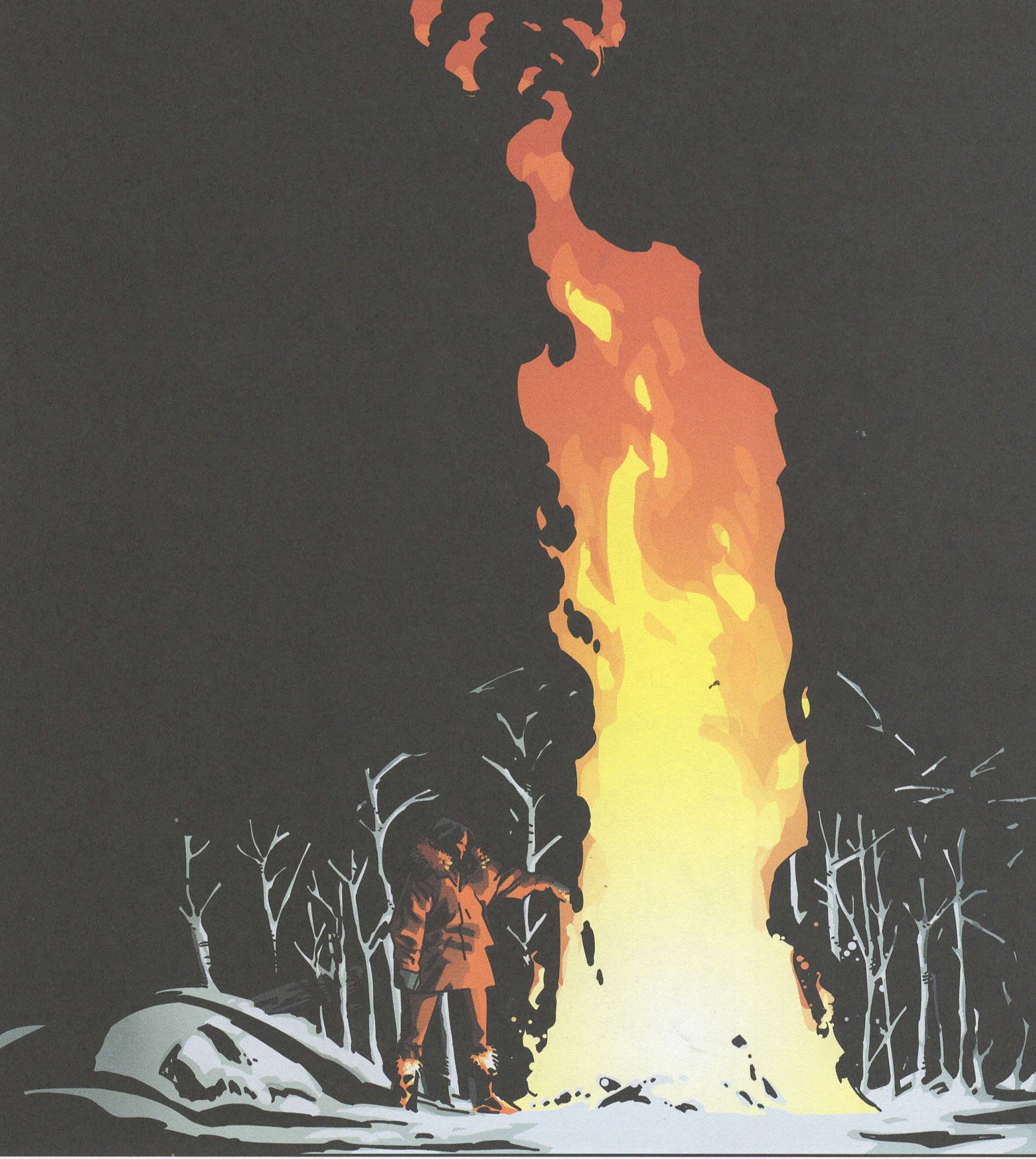"Just help me through this moment after everything I told you, how the weight of their loss is like the weight of the sun"
Kathryn and Stuart Immonen lead double lives in comics, and I, being the weird one, follow their far less popular one. On the one hand, of course, they're mainstays in mainstream superhero comics, and I enjoy the work they do there, even if I don't buy it very often because it's either too expensive or it's something I'm not that interested in.
That's great for them - it gets their names out there, and Stuart has been working in that arena for so many years that he's incredibly respected and popular. On the other hand, they work together on astonishing graphic novels, and those comics are often wonderful. Their latest, Russian Olive to Red King, is published by AdHouse Books and costs $24.99. It's a nice, thick hardcover - you know you love those!
The comic's plot is very simple: a woman named Olive leaves her lover, a man named Red, to do research for an unspecified project. She says she'll be gone a week. She flies north into a wintry forest, but her small bush plane crashes when the pilot has a heart attack or some other fatal event. She has to get back to civilization, and Red thinks that she has left him. Everyone has feelings.
In other words, it's a quiet, contemplative book. In some ways, this is a very welcome development, but the book doesn't quite reach greatness partly because of its nature. Olive and Red talk early on, and we get a brief sense of their relationship, but then Olive leaves and we have to deal with them as solo entities.
Olive is more interesting than Red, but it's mostly because she's in a more interesting situation - she's stranded miles from anywhere, and she has to survive while trekking through the forest in the hopes that someone will rescue her. Red is more of an enigma, because he just mopes around waiting for Olive to return. Olive is far more active, while Red is reactive, but with nothing but his own fears to react to, he becomes paralyzed. He also believes that Olive has left him instead of simply going away for a little while, and this drives him further into inactivity. The two characters are contrasted nicely, as Red is in the middle of civilization but feels isolated, while Olive, who is actually isolated, at least has a purpose. It's tragic to watch both of them, as we're unsure whether Olive will survive and we're even unsure if Red will survive, given that he almost seems suicidal. The loss of love is always a good vein to tap when you're writing fiction, and Immonen comes up with a clever way to show it - as far as we know, Olive is perfectly happy with Red, but even after he gets word that her plane crashed, he still seems to think that she has left him. Perhaps he means that she's "left him" in the most extreme way possible - that she's dead - but he still thinks of it as a betrayal. So on one side we get a fascinating look at the death of love, and on the other side a commitment to survival that will presumably mean a return to love. Neither character knows what the other is thinking, which makes the entire plot so much more tragic.
The problem with the book is the isolation of the characters.
Red interacts with more people during the story, naturally, but he's so taciturn and oblique that he might as well be talking to the other main character, the couple's dog (with whom he interacts the most). His dialogue is the best thing about him, though - Immonen is quite good at writing opaque dialogue that reveals far more than you'd expect, and Red's pain is clear whenever he opens his mouth. The problem with Red is that we don't really get a sense of him - he's some kind of writer, but he ignores the world in order to mope around, and even before he fears that Olive has left him, he's ditching a work assignment and avoiding taking responsibility for it. He's not stupid - he knows when Olive is quoting Chekov, for instance - but he certainly acts like someone who tries hard to avoid the real world even when he's happy and in love. Olive is more interesting, but only because of what she's doing. She has no one to talk to, so she talks to herself. Unfortunately, she often talks in quotes (more Chekov, I think, and some other stuff), and while I know I'm not very bright, I am really not sure how some of what she's saying is supposed to relate to her situation. In some places it's obvious, but in others ... not so much. I always appreciate writers trying to be oblique and not spell everything out, but there's a fine line, and I think with Olive, Immonen steps over it a bit too much. She does better with Red, but even then, there's a long prose section at the end that is narrated by Red in which he rambles on about looking for Jumbo the elephant's death site, and it doesn't add too much to the story, overall.
So it's a frustrating book - it's haunting, painful, and tragic, but also a bit less than it might be because we don't really get enough of a sense of the characters.
Obviously, though, the art is staggering. Unlike the Immonens' previous collaboration, Moving Pictures, this is in color, so Immonen doesn't have to use such sharp borders between black and white and can use more nuanced coloring, and the entire book is absolutely beautiful. Red is a granite slab, and when he interacts with others, the tentative dialogue and the way Immonen draws his face give us a wonderful portrait of a man who doesn't know how to react to tragedy. Immonen places him in an apartment overlooking the street, and he looks out on a world that he doesn't quite understand and tries to make sense of it, and it's devastating. At one point, Red returns a sweater he bought for Olive, and Immonen does amazing work in the brief scene - Red is a blank slate, almost, as he tries to give it back without revealing the reasons, and he desperately avoids eye contact with the perky saleslady, who compliments him on his taste before realizing that this man has some issues. In three panels with very little variation, Immonen shows the woman as scornful, dubious, and finally understanding. He changes almost nothing on her face, but we get each reaction perfectly. As the book moves along, the shadows creep into the apartment even more, until the patches of light from, for instance, the refrigerator when Red opens the door are almost too painful to behold. Immonen also does something clever with the refrigerator, as it slowly loses food but never gets restocked, a nice indication of Red's problems in getting on with his life. Immonen has to do something different with Olive, but of course he handles it wonderfully. She's in a vast area, and Immonen does beautiful work with the great forest around her. The expanse shrinks her, of course, as she's just a tiny part of it, but it's claustrophobic in a different way than Red's apartment, as she's so alone that the trees and snow are always embracing her malevolently, and she can never find her way out.
As she loses hope, she seeks out the false comfort of smaller places, even as Red is slowly entombed in his closed place. Kathryn is a smart enough writer to let Stuart do a good deal of the storytelling, and he brings the two characters together as the book reaches its end really well, as they both slowly reach the same conclusion in separate ways. The coloring is beautiful, too, as Immonen uses orange a lot in Red's world, turning it into an "unnatural" light so that when Olive is "safest" in the wilderness, we get an orange hue to stand against the darkness of the night. Usually, Olive's world is colored blue, purple, and pink (along with a lot of black, of course), and it's interesting how that is in contrast to Red's world. The scene in the department store when Red returns the sweater is an overwhelming pink, which heightens the awkwardness of Red's interaction with the saleswoman. Immonen has always been good at using blacks, and that's evident here, as the shadows almost look alive at times. Immonen uses gradients and drops holding lines well, too, so that the book looks realistic without sacrificing his sharp style or even doing away with flatter colors. Unlike so many modern colorists, Immonen can use gradients without smearing them across the line work, so that we get the crispness of his artwork but the subtleties of the best digital coloring.
There's a lot of great stuff in Russian Olive to Red King, but it falls short in some important places, which is why I don't love it more. Still, it shows that Kathryn remains an underrated artist and that Stuart is still a great artist, which we should all remember!
Rating: ★ ★ ★ ★ ★ ★ ★ ½ ☆ ☆

